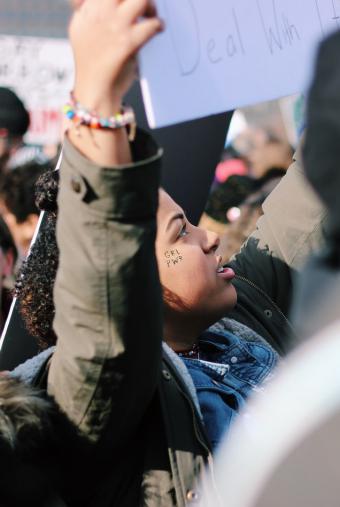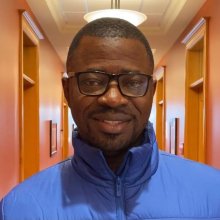With the introduction of these grants, the McKenna Centre wishes to contribute to wider efforts in our community and at StFX to take much-needed, decisive action in order to combat the continued presence of racism and the ongoing systemic exclusion and disenfranchisement of Black and Indigenous students in Canadian society and in higher education.
Each year, the McKenna Centre will offer up to six Racial Justice Leadership Grants of $4,500.
The grants are designed to provide Black and Indigenous students with funding and institutional resources in order to support projects that include research, organizing and outreach work, or advocacy and activism in the area of racial justice. In addition to funding specific projects, the grants offer students a range of opportunities to participate in the effort to shape the future of our university, and they provide students with opportunities for disseminating their work and ideas and with platforms for their voices. This includes providing students with a web-presence for their projects, offering them the opportunity to present their work at events such as the Friel X-Talks and the Winter Xaverian Leaders Symposium that focuses on Leadership and Public Service and that deals centrally with topics in leadership for racial justice and reconciliation. Furthermore, the grants will offer students the opportunity to connect and collaborate with a range of projects and organizations at StFX working on equity, diversity, and inclusion (including the AVP Research and Graduate Studies, the Human Rights and Equity Advisor, the Coordinator of African Descent Affairs, the Indigenous Student Advisor, the SU Equity Committee, the Centre for Teaching and Learning, StFX Student Services, the Centre for Employment Innovation, and so on). By supporting individual projects and by integrating student leaders in university planning efforts and initiatives, the grants aim to provide students with the opportunity to positively shape our university and to assist us in improving it for future generations of Black and Indigenous students.
We welcome applications by students from all fields and disciplinary backgrounds (undergraduate, graduate, professional, and part-time), and we warmly welcome applications from international students. While we appreciate project proposals specifically designed for the purpose of this grant, students are also encouraged to use these grants to support ongoing studies and research. Grants can therefore be used to fund brand new projects, but they can also be used to further cultivate projects that are associated with a particular course or program of study, to continue ongoing projects first developed through a different funding opportunity (such as summer research mentorships), to support honours and advanced major projects, and so on. We invite proposals that range from traditional academic research to projects that blend academic work with social engagement in the form of activism, advocacy, or community outreach.
Applicants are encouraged to explore the topic of racial justice broadly by leveraging their disciplinary and academic background as well as the knowledge connected to their own sociocultural background and the complexity and diversity of Black and Indigenous lived experience. We welcome project proposals and applications that consider racial justice as a crucial aim in all areas of life and academia, and we therefore encourage proposals that represent a wide range of backgrounds and interests.
From studying racial bias in medicine and scientific research to examining the effects of the under-representation of Black and Indigenous scholars in the education system, to examining the history of environmental racism in Nova Scotia and its connection to economics and policy to uncovering the history of under-discussed Black and Indigenous artists in the Maritimes, to charting the links between racial segregation and mental and physical health to researching the historical challenges and present opportunities of business ventures in Black and Indigenous communities, we are excited to see applicants explore the widest possible range of projects that deploy academic research in unison with social engagement to indicate necessary paths toward racial justice.
How to apply:
By July 1, submit an application package including:
- Resumé
- 1,000-word project description
- 1-page “time budget” that outlines a rough plan for how you will spend the hours that the grant fund
- 2 Letters of support that speak to the quality of the applicant’s proposal and to the applicant’s abilities involved in carrying out the work proposed in the application (referees may include professors, teachers, coaches, mentors, employers, and so on)
The project description is the core of the application and should be carefully prepared. In this piece, applicants should clearly describe the project for which they are requesting funding through this grant. Applicants should outline what they would like to accomplish with the help of this grant, and describe in detail how they plan on reaching the stated goals.
Your project description should consider and clearly answer the following questions:
- What topic or problem do you wish to research or work on?
- What is the significance or particular urgency of this topic or problem?
- What would you like to accomplish with the help of this grant? What will be the specific goal(s) or outcome(s) of your proposed project?
- What steps will you take to reach your goal(s)? How will you carry out your project?
- What do you see as the long-term benefits of your proposed work?
- How will you spend the time that is funded through this grant (300 hours for the academic year, 150 hours per semester)? Attach a “time budget” in order to outline your plan for the grant and its individual stages or steps.
Note: one way to organize the time spent on the grant may be to dedicate the fall semester to research, project development, outreach work, and so on, and to spend the winter semester on compiling and presenting results, participating in events, and sharing expertise with organizations and offices on our campus involved in efforts aimed at EDI.
Total time spent on the grant: equivalent to 300 hours (150 hours per semester).
Email your applications to: lead@stfx.ca
The McKenna Advisory Board will adjudicate applications immediately following the deadline and inform the six grant recipients, who can begin their work in September.






